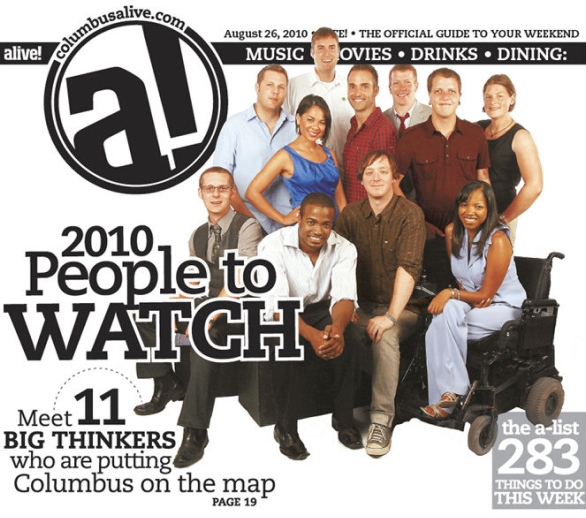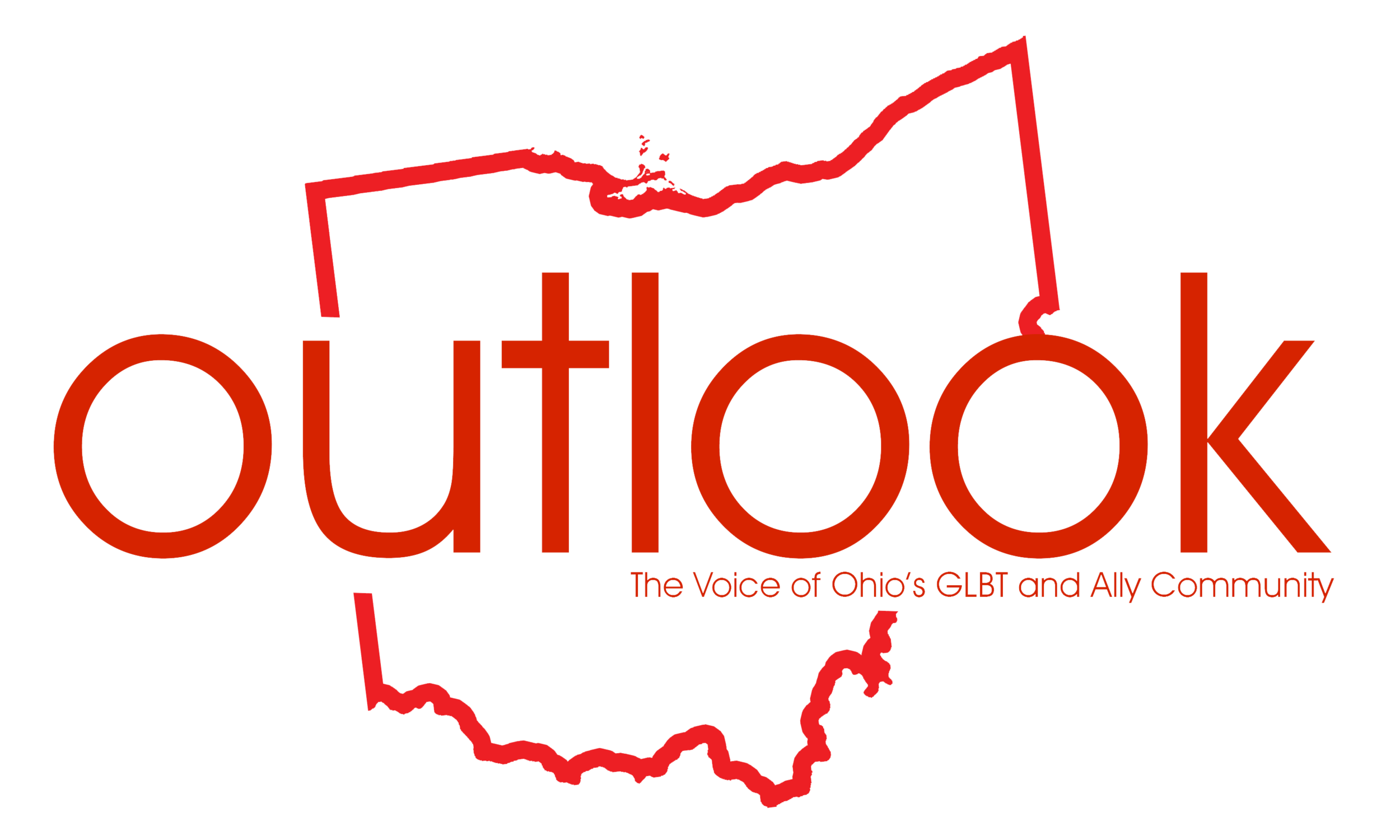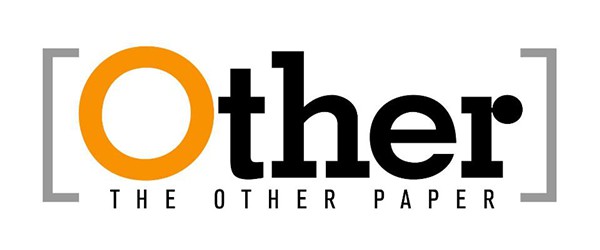Press

People to Watch: Mike Minnix
By Jessie Tigges, August 2010
As the brains behind Eartha Limited, Mike Minnix knows that being environmentally responsible should be operationally and economically viable.
By focusing on the restaurant industry, where 90 percent of waste is reusable, Minnix found an opportunity to have a substantial ecological impact while helping small businesses with their bottom line.
"We're not in it to make a billion dollars. We're in it to pass these costs on to our customers. They're doing the right thing by wanting to compost, by wanting to recycle," Minnix said.
Eartha's business plan has a three-pronged approach - consulting with restaurants to develop an eco-friendly strategy, helping them integrate affordable biodegradable products, and hauling away food scraps and recyclables - that makes being green both cost-effective and feasible.
Once Eartha receives approval from the Solid Waste Authority of Central Ohio - which Minnix expects any day now - the company can begin hauling away recyclables and food scraps from restaurants using trucks that run on used vegetable oil.
The recyclables will be stored in a 10,000-square-foot warehouse in German Village, and scraps will be delivered to a composting facility or nearby farms. None of the scraps will go to landfills.
The fewer pickups Eartha makes from a restaurant, the less the eatery will be charged. And Eartha won't have a set pickup schedule like traditional waste-management companies. Stops will be based on need and determined by electronically monitored bins.
Eartha's consulting efforts will help local restaurants transition smoothly into using eco-friendly practices.
"You can't be doing what I do and telling people it's going to be expensive, it's going to be hard, it's going to be hell on your employees," Minnix said. "We preach simplicity, cost neutrality and ease of use. This stuff isn't hard."
Local restaurateur Liz Lessner of Tip Top and Dirty Frank's fame has already partnered with Minnix, and Eartha has plans to work with some large-scale, Columbus-based food-service providers and event venues.
The future of Columbus looks green with Minnix's strong business plan and focus on goodwill.
"We're looking to make this a better place to live," he said. "[Eartha] is going to be a profitable business by caring about the community."

At White Castle, they’re going ‘green’
By Denise Trowbridge, March 2013
That plate of White Castle sliders might soon be sliding into a garden near you.
White Castle has launched a pilot program to compost all of its food and paper scraps at six Columbus-area restaurants. The company began composting at its corporate office in October, and rolled out the restaurant program in December.
“The team members are on board, and it’s gone smoothly,” said Shannon Tolliver, social responsibility and environmental sustainability manager at White Castle. “As a company, we’re always looking into cost-effective ways to reduce our waste. This is the way the culture is moving, and we want to be at the front end of the curve.”
Ohio Mulch composts White Castle’s discarded food, as well as that of several other local restaurants. Those former food scraps are available to the public as a new garden product: Green Envy, a high-quality garden soil and compost.
Incorporating a composting program into the routines of busy fast-food workers has been easier than expected. It’s just a matter of having separate trash cans for compostable items and garbage, the company said.
White Castle employees have had to change how they manage waste, and it “took a little bit of getting used to at first, getting everything in the right bucket, but now it’s really smooth and it’s not much extra work for the staff,” said Chris Shaffery, regional director for the company. Now, it’s second nature. “We compost hamburger boxes, towels, coffee filters and grounds, all food products, anything you can eat.”
The employees are excited that the company is making an effort to be greener, he said. White Castle uses Green Envy in the landscaping at some restaurants and at the company’s corporate offices. “We’ve completed the circle.”
The move has reduced each restaurant’s garbage bill, and the frequency of garbage pickup by about once a week, Tolliver said. At best, though, it’s only a break-even proposition. White Castle pays a specialty waste hauler, Eartha Limited, to pick up the compostable items and take them to Ohio Mulch.
The program is in the midst of a six-month trial. Participating restaurants are located at 1111 S. High St., 965 N. High St., 4525 Kenny Rd., 801 E. 5th Ave., 1555 W. Broad St., and 8787 Owenfield Dr. in Powell.
At the end of the trial, White Castle said it will consider expanding the program to more restaurants in central Ohio, and will consider testing it in other cities. But moving the program to other cities can be complicated, Tolliver said. “It’s a question of how to roll it out. Composting is so regional. You have to have a compost facility and a hauler.”
Central Ohio is lucky in that regard, as it has both. Ohio Mulch had the equipment and capacity to compost food waste, and the food-scrap composting project has been a boon for it as well. “Our customers are really excited about (Green Envy),” said Chris Smith, manager at Ohio Mulch.
It’s also saving the company money.
In the past, much of the rich soil needed to make premium garden-soil mixes was dredged in Michigan and then hauled here. Composted food scraps have replaced some of that Michigan dirt, and “It’s really reduced our transportation costs.”
Columbus also has a specialized waste hauler. Eartha Limited is in the business of helping food-service companies compost and reduce their waste. Formed in 2009 by Mike Minnix, the company helps more than two dozen local companies, festivals and universities compost their food scraps.
The list of local places composting food through Eartha is long and growing, and includes Pattycake Bakery, the Explorers Club, Ohio State University, Comfest, Tip Top, Katzinger’s Deli, Northstar Cafe, Ohio Wesleyan University, COSI Columbus and the Franklin Park Conservatory. Eartha hauls the waste to Ohio Mulch in a small truck fueled, in part, by used restaurant frying oil.
Food scraps are theNo. 1 material in landfills. In 2010, Americans produced more than 34 million tons of food waste, and only 3 percent of that was diverted from landfills and incinerators for composting, the U.S. Environmental Protection Agency said. Composting food scraps, rather than sending them to landfills, can reduce methane gas production at landfill sites and reduce waste-disposal costs, the agency said.
It also might be the way the restaurant industry is going. San Francisco passed a law in 2009 requiring restaurants to compost food scraps, and in recent years, restaurants in cities such as Denver have joined to start and sustain composting programs.
“It just makes sense to do this, and I think (composting) is just going to explode,” Smith said. “Sometimes, trash really is treasure.”

Sustainable Powerhouse
By Mckenzie Worrall, May 2012
When asked what he’s most proud of accomplishing with Eartha Limited, Mike Minnix proudly responds, “Changing the law.” That’s big for a 28 year-old, and technically, since he managed this almost two years ago, that’s huge for 26-year-old-OSU-dropout-parent’s-couch-living Mike. Who needs a degree, when you got passion, right?
And passion is in no short supply at Eartha. With love of the Earth and its sustainability, Mike created a new business venture out of only a few past sustainable side jobs – a venture that couldn’t even begin until he changed the law.
At the time, Franklin County was one of the last counties in the nation that classified restaurant food scrap as ‘hazardous waste.’ Absurd to all of us with a lick of common sense, the designation could only hold true if restaurants hung onto those scraps for a few weeks before trying to toss it. Being that one of the big components of Eartha’s business is food scrap hauling, it was imperative to overturn designation. To get an archaic law off the books, Mike teamed up with local restaurateur Liz Lessner and the Solid Waste Authority of Central Ohio (SWACO). After relentlessly and persistently educating and advocating boards across the city Mike and his cohorts were able get the law changed. Thanks to him, we joined the rest of the US in sensible scrap laws. Now, we can do cool things with that Thurminator you failed to finish.
Anaerobic Digesters – these giant pods are larger-scale versions of the compost bins from your backyard. They turn food scrap into renewable biogas. A single ton of waste yields about 18 gallons of the gas. Thanks to the process of anaerobic digestion, the landfills have less stinky food waste. And it’s a growing renewable resource, one that can and often will generate new income for restaurants by paying for bulk food scrap. Maybe you’ve seen the anaerobic digester off 71 South; there are only three digesters in Ohio, and we’ve got one within spitting distance. Mike is pretty confident that Eartha can eventually make this a new source of income for all restaurants, by basically turning what was once wasted money, into enough cash to at least break even on the raw ingredients.
He’s turning heads with the water-into-wine approach.
Founded in 2009, Eartha Limited exists to do a few humble things in this city. Aside from hauling food scraps, they educate and empower businesses to go green with serviceware that’s not harmful to the environment – serviceware that they also distribute in the Central Ohio area. Styrofoam is a sin, ladies, and seeing as how cities are starting to ban the use of it, Mike doesn’t think that Columbus will be too far behind. When businesses are at the point of having to re-evaluate how they do their disposable serviceware, I bet Eartha will be in a good spot with their affordable green options.
Growing up, I remember hearing about the mythical bread bowls and bread plates that would become a staple in my future; that soon, we’d all be eating off of edible and biodegradable dinnerware. The technology has only recently caught up with the idea. We’ve all had that terrible experience where a green disposable fork snaps in two while trying to eat. That’s why we haven’t seen more of them. “Compostable serviceware was too costly and not very high quality before. They were crap,” Mike says. “Your spoon would melt in the soup. That’s why slow progress has been made.” I take a sip out of my Cup O Joe coffee while he’s talking. “Look right here,” he says and spins my cup around. There’s a symbol for how biodegradable the cup is. “When you don’t notice the difference, the quality is there.”
For the Average Joe, you can find Eartha around town at the city’s festivals, donating energy and resources into smaller fests like Independent’s Day and partnering with the mainstays. Columbus loves a good outdoor party. Like any soirée, there’s a lot of trash left behind. That’s where Eartha comes in. “I don’t mind staying up late and hauling trash,” Mike says. For many festivals, the waste is a huge part of the preliminary budget. “To do good is to get good,” Mike believes. And he’s getting a lot of good by helping out so many of our city’s summer traditions.
Eartha is just getting started. While he’s already made a huge impact, Mike is still working to make his primary mission a reality. “I want to make this successful for everyone. Saving money while becoming sustainable – everyone wins.”
I think that Eartha’s model will become the mandatory way we handle all our food waste in the future. Evidence of that? Remember those anaerobic digesters? Ohio may only have three right now, but expect up to 12 more in the near future, which is great news for Eartha and our City. As Mike says, “It’s a very exciting time to be a garbage man.”

Waste No More
By Marta Madigan, Fall 2011
A partnership between a dumpster diver and queen of the sustainable restaurant movement in Central Ohio
Good fries are irresistible. That thought alone–mmm ….a basket of sweet potato fries with spicy mayo at Tip Top–will make your mouth water. (See sidebar for recipe.) But have you ever wondered what happens to the many gallons of oil bubbling away in the restaurant's fryers? Where does used grease go?"And what happens to the vegetable peels and scraps?
Mike Minnix–president, chief consultant and dumpster diver of Eartha Limited–did more than wonder about those things. Gaining experience as sustainability manager at Concessions by Cox, where others saw trash he saw potential."Over the past four years Mike has developed and implemented a handful of environmentally friendly programs enabling, for instance, Super Bowl XLIII and XLIV to go greener. He converted several tons of football food waste into compost for organic gardens. Hundreds of gallons of used vegetable oil were processed into biodiesel fuel. Meals were served on compostable plates and all the recyclables were actually recycled instead of piling up at the landfill.
Combining green solutions with modern technologies, Mike created a successful operation that did not pass unnoticed. In 2009, he picked up the Ohio Achievement Award for Green Business and Innovation. That same year he decided to dive into the sea of waste generated by the local food service industry. He quit his job with Concessions by Cox to open his own Columbus-based environmental company and approach his ideal client.
Our Queen of Green
Elizabeth Lessner–CEO and president of Betty's Family of Restaurants–had dreamed of becoming a "zero waste" business long before she met Mike. She spent her college years in San Francisco, the city that signed the nation's first law mandating separation of recyclables and compostables from normal trash. Aware of the eco-friendly practices of the West Coast, Elizabeth wanted to roll the three R's of reduce, reuse and recycle in her new hometown of Columbus, Ohio.
By offering a large variety of beers on tap at her debut restaurant Betty's, she helped minimize the waste of empty glass bottles. Installing energy-efficient lighting both at Betty's and at her second-to-open bar, the Surly Girl Saloon, she reduced energy consumption as well as energy bills. Recycling all aluminum, glass, plastic and cardboard significantly reduced the amount of solid waste in each of Elizabeth's growing family of fun food joints–altogether numbering five. "Everything that comes through a restaurant is not trash," Elizabeth reasons. "It is a byproduct and still can be used for something else."
Elizabeth soon earned well-deserved recognition for leading the way in Columbus's local and sustainable food service industry. She was the first restaurateur to receive a Columbus GreenSpot designation (see sidebar)–becoming the program's ambassador and helping others to reduce their waste ever since. She won the Central Ohio Emerald Award from the Solid Waste Authority of Central Ohio SWACO) and the Green Leader Award from the Ohio Environmental Council."She was also the 2010 Celebrating Visionaries honoree. Yet her appetite for less waste grew even more. She met Mike
Guilt-free to Go
Both energetic and eco-minded, Elizabeth and Mike hit it off during their first "trash talk." He knew how to recycle and organize. She in turn was experienced in running a happening chain of bars and restaurants. He wanted to work with organic waste; she couldn't wait to compost all her kitchen scraps. In no time, they became business partners.
At first, Mike provided Elizabeth consulting services by training her staff and collecting data. "I am a data geek," he confesses. "Gathering information is vital because you can see where pitfalls lie." Although many sustainable practices were already in place, he discovered that her takeout containers needed a truly green makeover. "Betty's Family were using these pretty 'to go' boxes," Mike says. "But they weren't as sustainable as they could be."
Selling genuine bio-products has been Eartha's focus from the very beginning. A new generation of cups, straws, cutlery, plates and clamshell boxes are made of"plant material such as corn, palm leaves or bagasse, a fibrous material harvested"from sugarcane. Fully compostable–if a fork from Mike's catalog gets mixed up"with organic waste, no worries; it will break down in less than two months. Plastic and Styrofoam, now old school, probably take hundreds of years to decompose– leaving chemical residues as they degrade.
Starting with Elizabeth's business in 2010, Mike quickly expanded his clientele to over 20 local restaurants. A bunch of bakeries, hotels and big events caterers have been purchasing his green disposable products since then. If you quenched your thirst with beer during Pecha Kucha or the Dublin Irish Festival, chances are you drank it from a PLA, or "corn plastic," cup distributed by Eartha.
Fork to Farm
Compostable service-ware and consulting are just the beginning. Mike and Elizabeth have set their sights on a sustainable future for the local food service industry. No haulers specializing in picking up waste from restaurants in Central Ohio? Eartha had an idea: become one. In order to start filling this market niche, they first had to jump through a series of legal hoops. Minnix realized existing laws had to change to make it economically appealing for him and his clients to see value in watermelon rinds and potato peels. Until last winter, all recyclables in Columbus were considered municipal waste and as such subject to fees collected on trash. Say Tip Top (one of five restaurants owned by Elizabeth) would have source-separated its food scraps and hired Eartha to process them locally. The restaurant would still have had to pay $9 per ton in fees to SWACO. "Restaurants generate a lot of heavy waste," Elizabeth comments. "We didn't want to put it to the landfill."
Photos from top: Elizabeth Lessner and Mike Minnix; a new generation of cups, straws, cutlery, plates and clamshell boxes made of plant material such as corn, palm leaves or bagasse.
Fortunately, the Green Economic Incentive Plan, approved by SWACO in March 2011, lifted recycling restrictions giving the green light to Mike and Elizabeth. Eartha could now apply to Ohio Department of Natural Resources for a grant, buy trucks and begin recycling and composting. "Our goal is to complete the cycle from farm to fork and back to farm," Mike explains.
Eartha already collects organic waste from a few restaurants and drives it to an outdoor composting facility and an anaerobic digester–a high-tech power plant that processes kitchen scraps, meat and dairy into energy. The byproduct of such an operation is a fertilizer that can safely enrich the soil of local farms and community gardens, thereby closing the sustainability loop.
Recycling with a Cause
The little over a year-and-a-half-old partnership between Mike and Elizabeth already inspires other local green initiatives. On Whittier Peninsula, at Eartha's headquarters, they cut a symbiotic deal with four friends.
Candle with a Cause handcrafts its boutique candles out of discarded wine bottles that Mike collects from Elizabeth's restaurants and brings to his warehouse. The bottles are cleaned, de-labeled, cut in half and filled with natural wax sourced from Ohio soybeans. Upcycled glass that otherwise doesn't have any value is then sold back to Betty's Family of Restaurants. Adding charm and helping a cause (25% of proceeds go to"local nonprofits or charities such as the Jack Roth Fund or Pelotonia)"the candles shed light on important movements that are happening all"around town.
Eartha's spacious warehouse and Mike's big heart allow gently used books to find a new home. Outdated textbooks, newspapers and magazines end up smashed in a bailer and sold on the commodity market together with other recyclables. "All the books that still have a lot of love left to give, we store them here and donate to anybody who wants them," Mike"says. Eartha was recently able to help the Girl Scouts with their project to furnish a children's library on an Indian reservation in South Dakota.
Facilitating food donation is something that Elizabeth and Mike also want to tackle. "If you are in the restaurant business and choose a charity it should probably be one that feeds people," Elizabeth believes. Working with big-scale events, Eartha will deliver good, unpurchased food to those in need through the Mid-Ohio Food Bank.
For now they are waiting to expand their fleet of trucks and install a biodiesel processor at their warehouse. Once Eartha starts to collect used vegetable oil from all Elizabeth's fryers, process it into biodiesel and fuel the trucks, watch out! They plan to service other Columbus restaurants, venues, hospitals, nursing homes and schools. The possibilities seem endless. Eartha might even start selling its own potato-infused biofuel. So next time you delight in a basket of fries at Tip Top– well, you know the story.

Landfill ends fee for recycling food scraps
By Elizabeth Gibson, March 2011
Officials removed a major barrier to food-scrap recycling yesterday when trustees with the Solid Waste Authority of Central Ohio voted to eliminate special fees and waivers, which had been required.
Recycling advocates said the move is a major policy change for an agency that has long struggled to reconcile two of its duties: running the county landfill and promoting recycling.
SWACO makes money from fees on every ton of garbage the landfill takes in, and those fees help run the landfill and pay off its debts. Recycling means fewer tons of garbage - and reduced revenue - so the agency set up recycling fees and regulations to compensate.
But SWACO officials have decided that they can make recycling work, said Ron Mills, executive director. He estimated that additional recycling under the new rules will affect, at most, 1percent of the agency's $36million operating budget.
In the short term, the change probably won't affect recycling of cans, plastics and cardboard, because SWACO often didn't collect fees on those materials anyway.
But under the old rules, companies that wanted to recycle food scraps would have had to apply for a waiver and pay $9 a ton for the privilege of not taking their waste to the landfill.
Those fees will now be waived if recyclables are processed in central Ohio, which Mills said he hopes will spur local innovation and jobs.
Kroger has several grocery stores in Ohio that recycle food scraps. At Nationwide Arena, the company that runs concessions, Sportservice, recently met with Rumpke Inc. to discuss recycling organic waste, Sportservice spokesman Glen White said.
Eartha, a consulting and recycling company, plans to begin hauling food waste with two trucks within the next two weeks. Mike Minnix, company president, said he plans to start out small at Tip Top Kitchen & Cocktails in Downtown and at other restaurants owned by Elizabeth Lessner to work out any kinks before expanding.
Eartha trains kitchen staffs and sells compostable products, such as cups and to-go cartons made out of organic materials.
By helping businesses collaborate, Minnix hopes Eartha can make eco-friendly products and recycling more accessible for small businesses that might not be able to afford them on their own.
"Today is a big deal," he said. "It shows that the system can be changed if people care, and more and more people care."
An estimated 50 to 60percent of what winds up in the landfill is recyclable, and the technology to mechanically remove those items and make a profit by turning them into energy has improved to the point where it's practical, Mills said.
SWACO staff members might start soliciting proposals within the year for a project to sort and profit from recyclables, possibly with public funding, he said.
"To me, this represents the next big leap in the waste-management industry," Mills said. "Our plan is to have this in place somewhere in Franklin County in five years, maybe three."
The new technology could replace curbside recycling, which the city is scheduled to begin in 2012.

At Work: Eartha Limited is Making Columbus Greener
By Anne Evans, March 2011
Mike Minnix has been interested in natural resources and environmental sustainability for quite some time. Originally from Columbus, Minnix went to Ohio Dominican for college, where he played football and had the goal of becoming a park ranger. When an injury ended his football days, he went to the Airforce Reserves and then studied at The Ohio State University.
It was during that time, while working as an event planner/sustainability manager for Concessions by Cox, that he saw just how much waste was generated in that industry. For Super Bowl XLIII, he helped install, manage, and implement environmental programs that helped reduce the waste and make it an environmentally friendly event. After coming home from the event, he knew he had a great idea and quit school to start Eartha Limited.
Using his personal savings, he founded the company in October 2009. After doing some consulting on how the Betty’s Family of Restaurants could lessen their environmental impact, he found a great friend and business partner in Elizabeth Lessner. Her many connections helped get the business going and growing, and helped with securing a loan from the Community Capital Development Corp.
Eartha has a 10,000-square-foot warehouse on the Whittier Peninsula. Minnix loves the central location and proximity to the Grange Insurance Audubon Center. The office space is outfitted in donated desks and shelving from King Business Interiors. The carpeting is FLOR tiles.
Eartha Limited employs five people: Mike Minnix, president, chief consultant, and dumpster diver; Elizabeth Lessner, co-founder and bag lady; April Kasun, general manager; Loren Foster, creative director; and Thad Davis in sales.
Minnix enjoys being a young entrepreneur and is happy to be able to employ other people. The space includes a gym so employees have a chance to work out and make themselves healthier. He loves being a boss and motivating people to care and be passionate about Eartha.
He has found mentors in Steve Grossman of Grossman Recycling, Mike Long, former executive director of SWACO, and Terrie TerMeer of the Ohio Department of Natural Resources. Grossman also partners with Eartha for its book recycling programs. Many of the books Eartha collects go to needy schools or Girl Scout programs that start libraries and schools in other countries.
Minnix said Columbus is leading the way in the environmental sustainability industry. He is happy to have a company in Columbus because people have pride here and want to be good to each other. They want young people to take a leadership role and have a voice in the community.
“Everyone is so willing to help everyone,” Minnix says. “People care about the city.”
Eartha Limited has a public drop off where they collect all kinds of waste. They also want your books. And restaurant food scraps. And vegetable oil. And your e-waste. Basically anything you are looking to throw away…contact Eartha first and see if they can take it. Most likely they can!
One of the main aspects of the business is making it easier for restaurants to get rid of all of the waste they generate in an environmentally friendly manner. Eartha will educate everyone, and do all the pickup and hauling for you. Education is another important aspect of the business because if staff and workers are not engaged and educated on the programs, they will not work.
Eartha also is a one-stop shop for compostable food products. Eddie Shepherd, general manager of The Jury Room, has recently signed on as the first business to use all compostable products from Eartha. And great news for the public! Eartha will soon have available open case items and people can buy what they need. So if you are having a wedding or a picnic, Eartha does the guesswork for you on what is the best green product available.

Founders Profile: Michael Minnix of Eartha Limited
When did you found your first business?
Eartha Limited was founded in 2009.
Did you consider yourself an entrepreneur before starting your business?
No, I did not. Before starting Eartha Limited (earthalimited.com), I was just finding myself as a young man. My interests varied across so many different fields of study that choosing one concentration was a very scary thought. I have always considered myself a leader and problem solver. Using these skills in the business world has just recently earned me the title of entrepreneur.
Where did you find your first employee?
I had met my first employee multiple times at various environmentally focused functions across the city. We became friends as we discussed the different possibilities in the field of sustainability. Our enthusiasm was mutual, but our skill sets differed; I knew from the start we would be the beginnings of a good team.
What has contributed most to your growth?
I look at this as a two part question. I’ve experienced personal growth along with the growth of my business. The personal growth has come from my renewed willingness to learn and listen. I respect this situation and want to become my best. The biggest factors contributing to business growth have been our passion and vision. We are not thinking about what is next, but what follows.
What companies or founder do you admire and why?
To control my opportunity to be great, I needed to become a master in the study of others. My first great mentor in social entrepreneurism is Benjamin Franklin. He was a great businessman among many things, but he spoke frequently on the virtues of doing good within the community. Through hard work and creativity he grew from an uneducated apprentice to one of the greatest figures in world history. In my opinion he is the ultimate founder.

Best New Business of 2011: Eartha Limited
By Walker Evans, December 2011
While Eartha Limited was officially started in 2009, it really came into its own in 2011, as evidenced by our annual reader survey that named Eartha the Best New Business of the year. Eartha was founded by entrepreneur Mike Minnix as a multifaceted company that would provide business-to-business consulting and more efficient waste solutions management. Additionally, Eartha sells compostable consumer products and takes part in other outreach efforts to raise awareness about both the business savings and environmental responsibility in proper waste management.

Stylish, eco-friendly tableware making the rounds for parties
By Carrie Schedler, July 2011
Each year, Americans throw out more than 1 trillion single-use plates, forks, knives and spoons.
Those plates? They’re used an average of 5 minutes before they hit the trash, according to Time magazine. Then it’s off to the landfill, where most won’t decompose.
And don’t forget the fuel required to get them to the store in the first place; trucks, planes and other shippers are the fastest-growing emitters of greenhouse gases, the Environmental Protection Agency says.
Suddenly, summer potlucks seem a bit more sinister.
But there’s no need to have an environmental breakdown.
As peak backyard barbecue season unfolds followed by fall tailgating — options exist for making parties a little more eco-friendly while still being stylish.
Eco-friendly disposables are an attempt to bridge the gap between durable multiuse tableware and their paper and plastic counterparts.
The new products are still meant to be single-use, but they’re made of greener materials such as bamboo, palm leaves and corn instead of petroleum-laced plastics and paper pulp. (According to Stanford magazine, most paper plates, unless they’re made of recycled materials, come from the pulp of trees that have been clear-cut from a forest well before the end of their life cycle.)
Eco-friendly alternatives, such as Verterra and Stalk-Market, can often be thrown into the compost bin when the party is over. Bonus points? Dispose of everything in a compostable trash bag.
“Everything you could use in food service has a compostable counterpart,” said Mike Minnix, president of Columbus-based Eartha Limited, which distributes eco-friendly tableware to retailers.
Eartha Limited sells several brands of ecologically friendly products, which use polylactic acid, a corn-based plastic; bagasse, a byproduct of sugar cane processing; natural paper, unbleached and chlorine-free; and palm leaves compressed in high heat.
The market “is changing very drastically,” Minnix said. “People are demanding these things every day.”
Part of the reason, he said, is because the generation that grew up with at-home recycling bins is now more conscious of the lasting effects of most disposables.
Josh Parker is the chief operating officer of Verterra, a company that produces a line of bowls and plates made from palm leaves compressed in high heat. The company tries to emphasize both sustainability and good design.
He said the products are an easy way to make a small change that has a big impact on the environment. The little choices people make every day, he said, make the difference.
“Green is not a light switch,” he said. “It’s a series of decisions.” cschedler@dispatch.com

Volunteers Double Recycling and Composting at Festival
June, 2012
NELSONVILLE, Ohio - Recycling made a big impact at the Nelsonville Music Festival due to the work of volunteers.
At May's festival in Athens County, more than 150 volunteers worked to divert 3,090 pounds of discarded materials from the landfill through composting and recycling.
Organizers said it was a two-fold increase from last year's diversion rate. Rural Action's Zero Waste Initiative organized the recycling and compost effort for the festival. Volunteers worked to collect and screen hundreds of bags of trash, recycling and compost to ensure that every bit of compost and recycling was captured.
Musicians gave shout-outs for the recycling and composting efforts that helped create a green vibe, according to a press release. Music publications like Paste Magazine wrote about the effort.
"Aside from the nicest of volunteers and vendors, a bevy of recycling and composting stations highlighted NMF's green efforts," the magazine reported.
Volunteers said they felt great about putting in the effort that made it happen.
"It definitely made me feel like I was giving something back to the event. I will definitely be back next year," said Ken Hart, first-time festival attendee and volunteer from Ashland, Ky.
Due to audience participation and volunteer sorting efforts, more than 1,234 pounds of recyclables and 1,856 pounds of compost were collected inside the festival gates. Volunteers also collected and sorted more than 600 pounds of aluminum cans.
Proceeds from the sale of the cans will help fund the recycling and composting efforts in future years. Recycling this amount of aluminum saved 3,900 kilowatt hours, festival officials said.
"The composting and recycling efforts at the NMF would not have been possible without the help of so many dedicated, engaged volunteers," said Zero Waste AmeriCorps volunteer Rose Keyes. "Every volunteer I talked to was genuinely interested in the work and excited to be able to help in such a tangible, hands-on way."
Post-consumer composting made its debut at this year's festival and boosted the numbers. Almost a ton of food waste, paper towels, napkins and compostable service was kept out of the waste stream.
Mike Minnix, with Eartha Limited, an event sponsor and compost service provider, said the festival was leading a movement to make the festival self-sustaining.
"Nelsonville Music Festival should not only be proud of the hard work and positive results, but for their leadership role in helping make festivals across the region more sustainable," Minnix said. "My experience working with the Zero Waste Initiative was very positive ... I was thoroughly impressed with not only the strategy but also the implementation of procedures and practices."
For 2013, Stuart's Opera House and Rural Action have plans to make Nelsonville Music Festival a true zero waste event by recycling or composting 90 percent of all discarded materials.
"This is an amazing event that really shows how a community can work together to create a positive experience" said Kyle O'Keefe, coordinator of the Zero Waste Initiative for Rural Action. "Everyone, including vendors, attendees, volunteers and sponsors, contributed to the effort. I believe we'll be aiming for 90 percent or better next year."
New strategies for waste diversion will include requiring vendors to serve food only on compostable or recyclable service ware. Brian Koscho, marketing and promotions coordinator for Stuart's Opera House, said they hope to do more composting back stage and in their hospitality areas as well as increase the educational efforts.
Other waste-reduction efforts will continue, including reusable beer mugs, filtered refillable water stations, solar power, and GoBus transportation to Columbus and Cincinnati, Koscho said.
The Appalachia Ohio Zero Waste Initiative is coordinated by Rural Action in partnership with the Voinovich School of Leadership and Public Affairs at Ohio University.

Betty's Goal is Zero Waste
By Denise Trowbridge
Trash bins full of table scraps, cardboard, cans and bottles have always been a byproduct of the restaurant business. It doesn't have to be, says Elizabeth Lessner, president of Betty's Family of Restaurants.
By the end of this year, she hopes her business - which runs Betty's Fine Food & Spirits, the Surly Girl Saloon, Tip Top Kitchen & Cocktails and Dirty Frank's Hot Dogs - will become central Ohio's first zero-waste restaurant group.
Lessner and her employees are attempting to significantly reduce the amount of waste they produce, then find a way to recycle, reuse or compost everything that is left. The goal is to prove that green, eco-friendly initiatives and waste-reduction programs are possible and economical.
They're off to a decent start.
All four restaurants recycle all the cardboard, glass and aluminum cans that come through the door. They serve a lot of draft beer, to reduce the number of empty beer bottles, and canned beer because aluminum is easy to recycle. All to-go orders and leftovers are packaged in recycled paper or corn-plastic containers.
The Surly Girl Saloon and Betty's use energy-efficient lighting, and the Tip Top and Dirty Frank's will soon follow. Restaurants use five times as much energy per square foot as other commercial buildings, and energy accounts for 30 percent of their annual operating costs, according to the National Restaurant Association. Replacing one incandescent bulb with a compact fluorescent can save a restaurant $30 over the life of the bulb.
The table-scrap goal is a bit more difficult. The discards can't be composted on site because the process can be a messy, smelly and rat-drawing affair. Instead, they're hoping to ship it to the Solid Waste Authority of Central Ohio, which coordinates the composting of Columbus yard waste.
Discarded glass might go to local artists, recycling centers or manufacturers such as Weisenbach Recycled Products. (A video of Weisenbach recycling the bottles from the Tip Top and Betty's can be viewed on their Web site, www.recycledproducts.com.)
Consultant Michael Minnix, president of Eartha Limited, is going to help the Betty's group conduct a waste audit and refine their recycling efforts. Eartha Limited is a Columbus-based environmental consulting company that can help businesses navigate waste contracts and find grants and tax incentives to help in their environmental efforts.
Minnix says restaurants can go green without spending a lot of green.
Reducing waste can be as simple as switching from paper towels to electric hand-dryers in the ladies' room, Minnix said, and recycling can be as easy as putting a trash bin for glass or cans behind the bar. "Most of these programs don't cost a thing," he said. "And the money they save can offset the cost of bigger changes like more-efficient lighting or kitchen equipment. It can be a cost-neutral process."
It isn't yet clear how much the recycling and composting will cost - or save - Betty's in dollars and cents, but "we think it will be a cost-saver in the long run," Lessner said. "The immediate goal is to make all of this as cost-effective as possible."
Converting to energy-efficient lighting is already paying off, with the Surly Girl Saloon and Betty's on track to save a combined $8,100 a year in electricity costs. The Surly Girl Saloon replaced 136 bulbs with more-efficient models, at a cost of about $3,000. After energy incentives and rebates, the total cost was $1,626.
Greener products are becoming more affordable, which is helping Lessner's efforts.
Recycled to-go containers now are cheaper than foam boxes, Lessner said, because Ohio State University started using the recycled variety.
Recycling and energy-reduction strategies can sometimes pay off in customer count as well. "Some people care and some people don't. But this will make the people who do care about the environment more loyal," Lessner said.
"The core value of the company is that we want to leave our communities better than we found them. It sounds hokey, but it's true."

Talking Trash
Betty’s Family of Restaurants owner Liz Lessner has a dream that was borne out of 10 years of frustration waiting on someone else to get it done.
“I finally just said, ‘Let’s just be the powers that be because we can’t get this done any other way,’” she said.
The dream, said Lessner, is turning the tons of waste from Central Ohio’s restaurants into something useable like, say, compost. Easy enough. There are lots of places that will accept restaurant’s recyclable materials like food scraps and compost. The problem is that there’s no one to haul it. Enter Lessner.
If all goes according to plan, she and her earth-friendly composting partner, Mike Minnix, will open a 30,000-square-foot storage facility in Franklinton by August that employs 20 to 50 people and utilizes trucks that run on restaurant grease to pick up paper, glass, plastic and other recyclables, including food scraps, from Downtown restaurants and transport it to a state-of-the-art composting facility on the city’s south end or, in the case of food scraps, to surrounding farms.
Her goal, Lessner said, is to make her first restaurant—Betty’s Fine Food & Spirits—100 percent waste-free by 2011.
There’s just one small glitch: She hasn’t gotten the green light from SWACO yet.
“They have to get approval from us,” said John Remy, spokesman for the Solid Waste Authority of Central Ohio, upon first hearing the news.
“We’re all for recycling and waste reduction,” he said, adding that a portion of SWACO’s income comes from its environmentally friendly Green Energy Center, where methane from the county landfill is collected and sold, as well as used to make compressed natural gas that runs 12 of their fleet vehicles. The major source of its funding, however, comes from tipping fees associated with filling the Franklin County Sanitary Landfill. “But we were given the power to implement rules and one of the rules says that anyone who sets up a transfer site has to meet our site criteria and get approval from staff and trustees.”
Thus far, Lessner hasn’t done that.
The Ohio legislature passed a law in 1989 that said every county must belong to a waste management authority. The move was intended to help coordinate waste disposal and management in Ohio, in addition to enforcing environmental requirements of waste haulers, businesses and other entities.
As to whether or not SWACO would approve Lessner’s new project, Remy said it’s not up to him.
“That’s not for me to say or for me to decide. As I said before, we encourage recycling and we’re all about waste reduction. That’s our job,” said Remy. “But to do it right, in terms of making sure everything is as it should be, they have to come to us.”
Lessner she said hopes SWACO will see the wisdom in her partnership with Minnix under the new business name Eartha Limited. Minnix originally started Eartha as an environmental consulting company after helping his then-employer, Concessions by Cox, an event planning company, secure food and beverage contracts for events and VIP catering at the Ohio State Fair and the Super Bowl for the last two years based on his green concepts. Minnix’s job was to make sure the company’s efforts were as green as possible by incorporating bioproducts and recycling into the way concessions were handled.
“I looked at the need for a better way to waste haul,” he said of his efforts, which currently are being modeled by the U.S. Environmental Protection Agency for national large-scale events. “There’s a lot being put in a landfill that doesn’t need to be.”
Minnix, who served in the U.S. Navy for five years and is “taking a break” from the Ohio State University environmental policy program, said what makes his endeavor with Lessner unique is that it focuses specifically on restaurants and food service providers, such as schools, nursing homes and hotels, as well as collection of compost and food scrap materials, which isn’t being done in Franklin County or the city of Columbus.
According to Columbus Public Service spokesman Rick Tilton, the city of Columbus only provides waste collection for 327,000 residential households. And 227,000 single family homes receive yard-waste collection service.
“(We’re serving) a niche market,” said Minnix, adding that he and Lessner are positioning themselves and Columbus as a leader in the next energy revolution—anaerobic digesters that could eventually fuel power plants.
“It’s coming in the next couple years and Ohio is leading the way,” he said. “We want to be the first on the scene. We’re offering sustainable hauling where it wasn’t offered before.”
The Kurtz Brothers, Inc. and Quasar Energy Group, a subsidiary of Kurtz Brothers, are on the leading edge of that movement locally, having secured land on the south end, where they’re currently building an anaerobic digester system at Jackson Pike.
SWACO leases that land from the city of Columbus and, in turn, subleased it to Kurtz, said Remy.
According to Kurtz’s website, the anaerobic digester will process the very compost and food remnant materials from the city of Columbus that Lessner and Minnix are proposing to haul. The company’s site said it will convert the food and yard materials into at least “40,000 tons of compost a year.” The website reported that Kurtz would then “convert the compost’s bio-gas into natural gas or electricity” creating enough “to power 400 to 500 homes.”
The biggest need in making that effort go, however, is getting the waste products to the anaerobic digester. That’s the niche Lessner and Minnix hope to fill.
Lessner said the response from Downtown restaurants has been overwhelmingly positive thus far—though she couldn’t name names due to waste contracts that might have to be broken.
“People are dying to compost. People want to do the right thing. But there are no haulers and customer service (from some of the current waste haulers) is atrocious,” Lessner said, adding, “People can’t wait to get on board.”
Lessner said she understands that there are permits she’ll possibly have to acquire from the Franklin County Health Department and Columbus Public Health and she’s prepared for that. She’s also prepared to be a friendly neighbor to Franklinton residents—she and Minnix have the blessing of Franklinton Development Association director Jim Sweeney—by controlling smell through charcoal-lined containers and getting composting material off the premises daily to either adjacent farmers for feeding their hogs or to composting facilities. No composting will be done on-site.
All that’s left now, she said, is the hope that SWACO “will want to see a progressive plan to get food waste out of landfills.”
“If the goal is to reduce, reuse and recycle, then I think we and SWACO are on the same page,” she said.
Remy said there’s no timeline for the approval process—only that Lessner and Minnix must contact SWACO to get the process for approval started.
